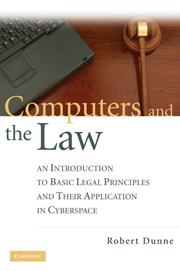Book contents
- Frontmatter
- Contents
- PREFACE
- ACKNOWLEDGMENTS
- 1 THE COMMON LAW AND STATUTORY LAW
- 2 CONTRACTS
- 3 TORTS INTRODUCTION
- 4 DEFAMATION
- 5 THIRD PARTY LIABILITY
- 6 COPYRIGHTS
- 7 TRADE SECRETS
- 8 TRADEMARKS
- 9 THE RIGHT OF PRIVACY
- 10 E-MAIL
- 11 THE RIGHT OF PUBLICITY
- 12 CONSTITUTIONAL LAW
- 13 PORNOGRAPHY AND OBSCENITY
- 14 ADVERTISING AND SPAM
- 15 JURISDICTION
- AFTERWORD
- INDEX
4 - DEFAMATION
Published online by Cambridge University Press: 05 June 2012
- Frontmatter
- Contents
- PREFACE
- ACKNOWLEDGMENTS
- 1 THE COMMON LAW AND STATUTORY LAW
- 2 CONTRACTS
- 3 TORTS INTRODUCTION
- 4 DEFAMATION
- 5 THIRD PARTY LIABILITY
- 6 COPYRIGHTS
- 7 TRADE SECRETS
- 8 TRADEMARKS
- 9 THE RIGHT OF PRIVACY
- 10 E-MAIL
- 11 THE RIGHT OF PUBLICITY
- 12 CONSTITUTIONAL LAW
- 13 PORNOGRAPHY AND OBSCENITY
- 14 ADVERTISING AND SPAM
- 15 JURISDICTION
- AFTERWORD
- INDEX
Summary
Introduction
Defamation can be either written (called “libel”) or spoken (called “slander”) but for the purposes of this discussion we will simply refer to both types as “defamation,” since whatever form it takes, the same elements and analysis apply. Defamation is a very large problem in cyberspace both because it is so easy to distribute statements widely and quickly, thus inflicting great harm on a person who is defamed, and because of the ease with which anonymity can be achieved.
There are four elements required to establish defamation. The first of these sounds obvious: the statement must be “defamatory.” To be defamatory, the statement must assert some defamatory fact. Mere “name calling” does not qualify. If a statement is not obviously defamatory then its defamatory nature must be established by interpreting the facts of the case. The plaintiff has the burden of establishing that in the context of the facts, the statement is defamatory by implication. Even a statement made in jest can be defamatory if it is not understood that way by the recipient of the statement.
“Opinion” is not always a protection against an allegation of defamation. Once again, it depends on how the statement is interpreted. However, a statement that is merely an opinion, and is interpreted as such, is not defamatory. A statement that implies an allegation of some undisclosed defamatory fact or facts that are the basis for the statement is not simply an opinion.
- Type
- Chapter
- Information
- Computers and the LawAn Introduction to Basic Legal Principles and Their Application in Cyberspace, pp. 67 - 82Publisher: Cambridge University PressPrint publication year: 2009



